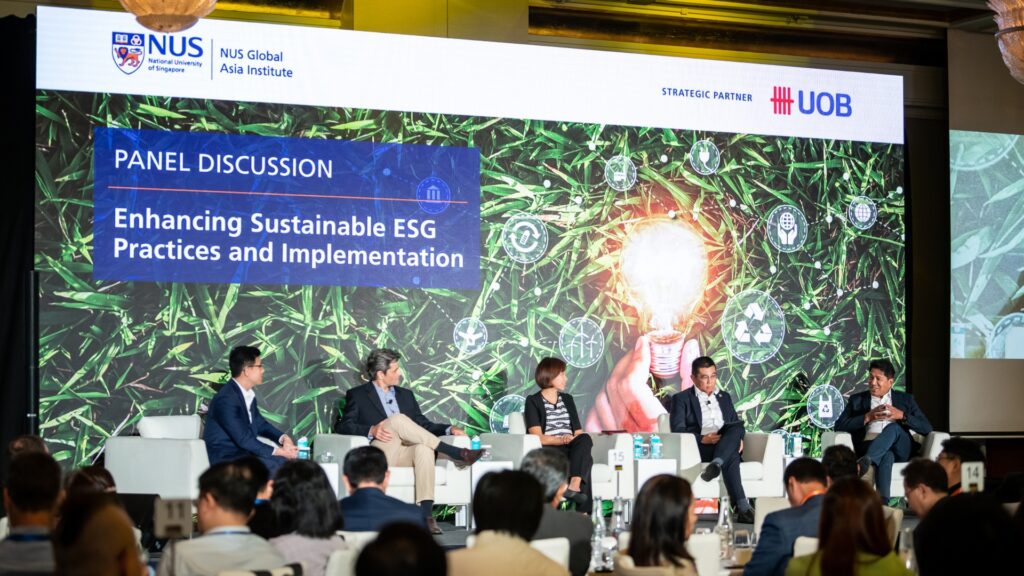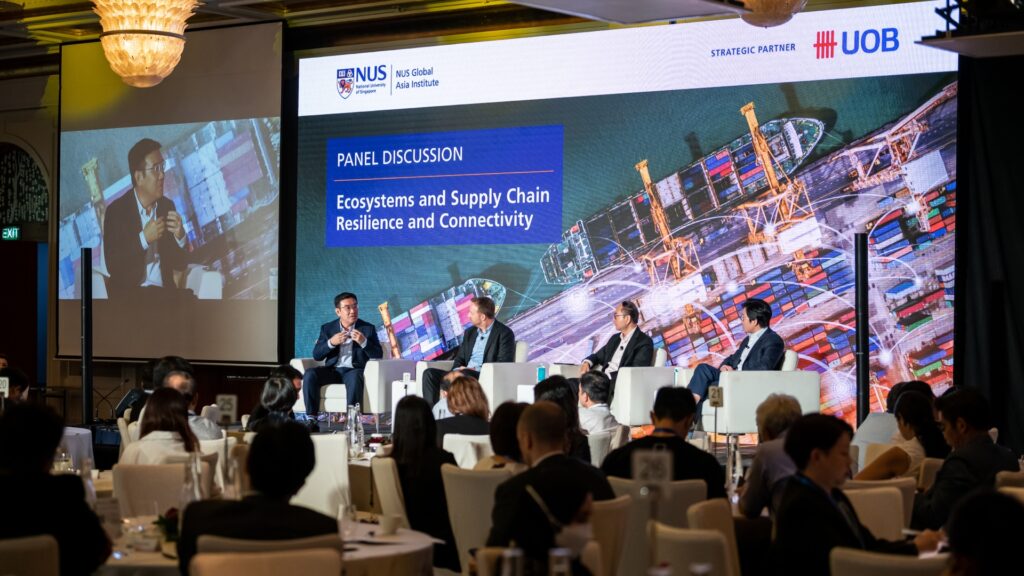Carbon Scorecards for Individuals, ESG and Supply Chain Resilience Take Spotlight at Wee Cho Yaw Business Forum
March 29, 2023
IN BRIEF | 5 min read
- This novel proposal is a possibility in a world where digital payments are becoming increasingly common, making it easier to track the items people buy, observed Alberto Salvo, Associate Professor in Environmental Economics and Associate Director at the National University of Singapore (NUS) Global Asia Institute.

The world has a carbon budget, and corporations pay carbon taxes for greenhouse gas emissions. But what about holding individuals accountable too, and taxing them based on their carbon footprint?
This novel proposal is a possibility in a world where digital payments are becoming increasingly common, making it easier to track the items people buy, observed Alberto Salvo, Associate Professor in Environmental Economics and Associate Director at the National University of Singapore (NUS) Global Asia Institute.
“When I fill up the tank at Shell, getting 40 litres of petrol, or when I go to FairPrice and buy a kilogramme of beef, it’s conceivable that through my digital payment, the retailer would know my NRIC or my FIN, and report the quantities of my purchase to IRAS (tax authority), and the carbon content of those purchases,” said Assoc Prof Salvo.
Going by these purchases, a carbon scorecard could be calculated. For instance, beef tends to be a high greenhouse gas emitter. “If you switch out beef and (opt for) chicken, you are reducing the carbon emission by 80 per cent,” he noted.
In this vein, Assoc Prof Salvo supported the idea of a carbon scorecard as it would make people more aware of the environmental impact of their actions. “Our choices matter,” he stressed. “We are part of the problem, but also part of the solution.”
Different ways to go green
Assoc Prof Salvo was sharing his views during a panel discussion at the Wee Cho Yaw Business Forum, held at the Four Seasons Hotel Singapore on 17 March. Organised by NUS Global Asia Institute and supported by UOB, the forum was a platform for thought leaders to share perspectives and best practices on business-related issues. More than 240 people attended the one-day forum.
In line with the theme, Building Connected and Sustainable Organisations and Ecosystems, 10 experts from academia and industry shone a spotlight on topics such as environmental, social, and corporate governance (ESG) and supply chain resilience amid rising geopolitical tensions and climate change.
At agri-food company JAPFA, various things have been done to bolster sustainability efforts. “We issued a sustainability-linked bond in 2021, and it was three times oversubscribed,” said Mr Kevin Monteiro, its Executive Director and Chief Financial Officer.
The company also offers sustainability training to its top management as well as its financial controllers, and will be extending this to other staff in a bid to get everyone on board the green drive.
Some panellists also proposed policies they hope to see implemented to further spur sustainability.
The authorities could also grant “first movers” – firms that spearhead new ESG initiatives – certain advantages, added construction group Samwoh’s Chief Executive Officer Eric Soh.
Banks can also make a difference by offering incentives to companies to support them in their efforts to embrace sustainability within their organisations, suggested Mr Monteiro. He noted that the costs of going green could put off some businesses. “Organisations might have people that want to follow sustainability but cannot because of (the) ESG cost versus benefit.”
Supply chain resilience
Aside from issues involving ESG, the experts also pondered the future of supply chains.
“The world can never go back to where it was before the 2022 (Russia-)Ukraine War, the 2020 COVID-19 outbreak or the 2018 US-China trade war,” said keynote speaker Frederick Chin, UOB’s Head of Group Wholesale Banking and Markets.
He highlighted three themes businesses should note in these uncertain times: technology and innovation; ESG becoming mainstream; and opportunities in major economies such as ASEAN countries as supply chains are reorganised.

Panellists also spoke about the need for closer collaboration in supply chain management.
“The Holy Grail, so to speak, has always been ‘Can we have supply chain integration and sharing of information across the different parties in supply chain?’” said Associate Professor Goh Puay Guan from NUS, whose expertise lies in supply chain management and technology management.
In such a system, for instance, information across the supply chain might be tracked, gathered and updated in real-time, allowing firms to anticipate disruptions and plan ahead.
“Traditionally, that has been difficult for various reasons,” he added, citing costs as well as companies’ reluctance to share their data.
But things have changed over the last two to three years, as multinational companies become better at putting the idea of a “supply chain control tower” into practice, he noted.
Rising costs in the marine sector – from energy prices to logistics – was another issue addressed during the forum.
Add green energy considerations to the mix, and you have a perfect storm, suggested Mr Choong Sheen Mao, director of Equatorial Marine Fuel Management Services, a marine fuel logistics company.
“As the world goes green, it is creating a kind of hurricane to change the whole supply chain. How do we calculate costs, how do we review our businesses or find new ecosystem partners?... We feel a lot of pressure,” Mr Choong added.
This story first appeared on NUSnews on 28 March 2023.

